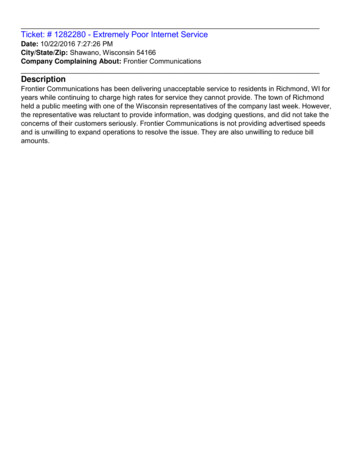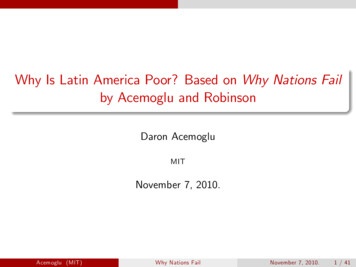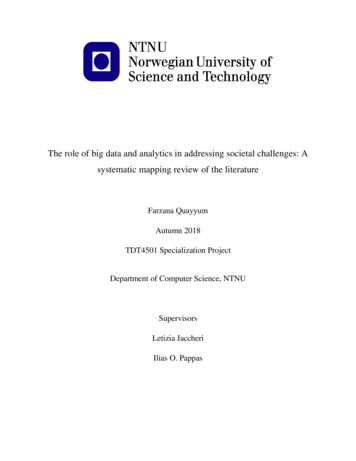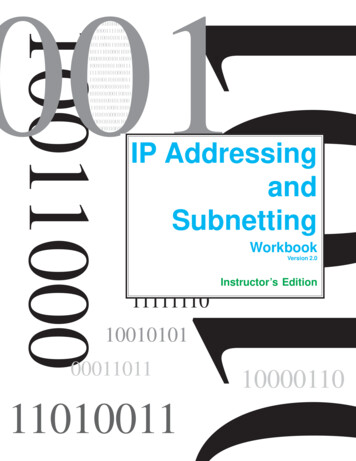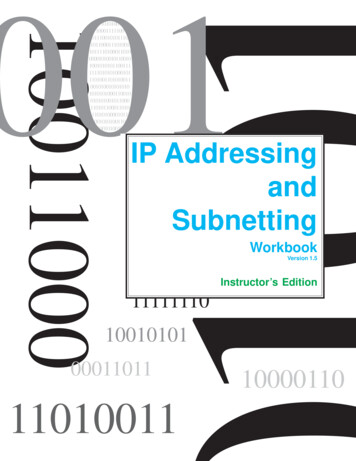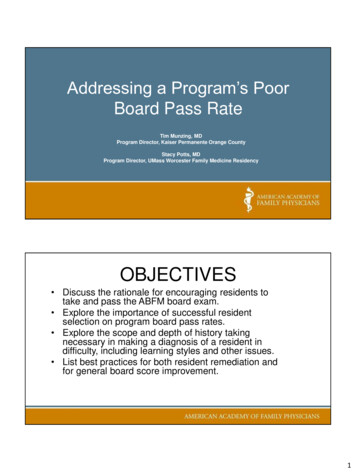
Transcription
Addressing a Program’s PoorBoard Pass RateTim Munzing, MDProgram Director, Kaiser Permanente Orange CountyStacy Potts, MDProgram Director, UMass Worcester Family Medicine ResidencyOBJECTIVES Discuss the rationale for encouraging residents totake and pass the ABFM board exam. Explore the importance of successful residentselection on program board pass rates. Explore the scope and depth of history takingnecessary in making a diagnosis of a resident indifficulty, including learning styles and other issues. List best practices for both resident remediation andfor general board score improvement.1
Over the Sahara DesertUMass Worcester FM ResidencyProgramWe will attract, foster, and graduatelearners who will be leaders oftomorrow, sustaining our passionthrough their excellence in state of theart, full breadth family medicine.Founded 197312-12-12University Based, Diverse Communities2
OUR STORY3
Reasons to take (and pass) the BoardsFor the Program:For the Helps improve theprogramPatient: residency(discover curricularweaknesses to address).Better Need a high board passrate for accreditationclinical( 90% averaged over 5years).outcomesFor the graduate: Seal of approval Contributes to life-longlearning (MOC). May help build a practice, ifpatients check your boardcertification on the ABMSor ABFM website.Barrier reduction strategy at WFMR Don’t have the money, our department shiftedadditional education dollars to the PGY3 year. Don’t have the time, we started focused workwith residents in 2010. Board review course added to core curriculum Individualized referrals to our University Center forAcademic Achievement – Using the Bayesian ScorePredictor4
Kaiser PermanenteOrange County - California5
Kaiser PermanenteOrange County - California First class – 19948-8-8 Program20 Graduating Classes100 Graduates100% Board Pass RateABFM Board Certification ScoresKP Orange County FMRPABFM Board Certification Scores610590570550530510490470450KP-Orange CountyNational 5646
Case Example PGY 1 residentUS Medical SchoolInpatient Medicine– Poor presentations– Poor knowledgebase– Hard worker– Well liked by othersInpatient Pediatrics– As above Clinic– Slow– Superficial anddisorganizedpresentations– High patientsatisfaction scoresIn-training Exam– 20% for PGY 1year nationally7
Resident Remediation nd residency time if notready to graduate and pass theboards8
Essential Needed Resident Skills Organizational/preparation skillsTime efficiencyProactivity vs Passivity (Sense of urgency, prioritizing tasks)Study skills-Concentration/Memory Reading/comprehension Notetaking Organized access to information -Learning Preferences-Auditory/Visual/Kinesthetic Thinking skills -Memorize Algorithm Integrated/Conceptual Creativethinking Metacognitive skills9
Essential Needed Resident Skills Motivation– Critical curiosity, practice improvement, excellence, life-long learning,adaptability Interpersonal skills (effective positive communication)– Empathy/listening, teamwork, conflict resolution, feedback skills, earnrespect/trust, integrity, compassion, advocacy, effective limit-setting Professionalism skills (positive attitude/behavior/appearance)– Sense of responsibility, ethics, self-awareness, self-regulation, aware ofself-limitations, self-care and improvement, self-confidence, reflection,ability to seek help, personal satisfaction, receiving feedback Performance skills– Stress/anxiety management, test-taking skillsDifferential Diagnosis Cognitive: knowledge deficit, dispersed knowledgePsychomotor: technical skillsAffective: adjustment, attitudinalInteractional: oral communication, listening, socialProfessionalism: appearance, behaviorPerformance: structural, test-taking, anxietyImpairment: mental illness, substance abuse, disability(physical, learning)10
Management Strategies- Knowledge Dispersedknowledge Dispersed knowledge– Learn from patientcare issues– Mini-SOAP– Algorithmdevelopment– Compare/contrastReduced KnowledgeReducedKnowledgeSkillsDevelopment- Knowledge22 Memory Difficulties Learning Difficulties Study Skills Memory exercises/repetition, extra study time Reading strategies Writing strategies Study skills-note-taking Test-taking skills training Pre-assigned reading Taped lectures Repeat rotationsProprietary and confidential. Do not distribute without permission.11
Management ingskillsTeamworkskills12
Management Strategies-Performance Structural–––––Slow workerInefficient workerOrganizationalPoor habitsOverwork Test-taking Performance anxiety13
PerformanceStrategies Structural Skills Time management Efficiency skills Organizational skills Work habits EHR Work scheduleCDC Prescribing Guidelines (2016)- Published JAMA – March 15, 201627PerformanceStrategies Test-taking Knowledge Reading/comprehension Test-taking skills Anxiety Counseling/therapyCDC Prescribing Guidelines (2016)- Published JAMA – March 15, 20162814
Management Strategies-Professionalism Appearance/behaviorEthical issuesLegalWork/life balanceProfessional skillsProfessionalismStrategies Clear expectations Rules/regulations andpolicies Compliance/ethicstraining Coping strategiesCDC Prescribing Guidelines (2016)- Published JAMA – March 15, 20163015
ProfessionalismStrategies Practice improvement Reflection skills Life-long learning Personal improvement EQ skills Self-care Role-modelCDC Prescribing Guidelines (2016)- Published JAMA – March 15, 201631Management Strategies –Adjustment and Attitude Adjustment– Illness– Death– Marital– Financial– Work-life balanceAttitudinal– Irresponsible– Avoiding– Affronting– Inappropriate– Patient-related16
Adjustmentand Attitude Supportive care/services Bereavement Medical illness Marital counseling Financial services Stress management Coping strategiesCDC Prescribing Guidelines (2016)- Published JAMA – March 15, 201633Adjustmentand Attitude Psychotherapy Assertiveness training Anger management Behavioral modification Role-modeling Videotaping Actor simulationsCDC Prescribing Guidelines (2016)- Published JAMA – March 15, 20163417
Mama’s Fish House, MauiSome Best Practices Have the residents take SAM’s (60%more likely to pass, 18 more points tocomposite score, from ABFMpresentation at 2013 RPS workshop) Have the residents do the monthly AFPmonthly CME quiz (more practice thebetter) Monthly practice sessions led by faculty Start remediation early-after the first intraining exam.18
Best Practices Utilize ABFM ITE scores to identify thoseneeding a more intense individualeducational program Examine ITE specialty scores to identifyareas of weakness Use of prior ITE exams to use for studyand practice19
Best Practices AAFP Board Review Courses – DVD’s,on-line Family Medicine board review texts(multiple available) Case-based study scenarios – meetingweekly with an attending20
Test Taking Strategies Read the question before you look at the answer.Come up with the answer in your head before looking at the possibleanswers, this waythe choices given on the test won't throw you off ortrick you.Eliminate answers you know aren't right.Read all the choices before choosing your answer.If there is no guessing penalty, always take an educated guess and selectan answer.Don't keep on changing your answer, usually your first choice is the rightone, unless you misread the question. Test Taking Strategies In "All of the above" and "None of the above" choices, if you arecertain one of the statements is true don't choose "None of theabove" or one of the statements are false don't choose "All of theabove".In a question with an "All of the above" choice, if you see that atleast two correct statements, then "All of the above" is probablythe answer.A positive choice is more likely to be true than a negative one.Usually the correct answer is the choice with the mostinformation.21
Summary Earn respect Diagnose correctly through thorough history-taking Get “buy-in” from resident to ensure understandingof difficulties Build resident “tool box” for effective skilldevelopment Provide guidance in safe learning environment Positive re-enforcementThe End Questions or comments ? Contact informationTim Munzing, M.D.Kaiser Permanente1900 E. 4th StreetSanta Ana, CA 92705PHONE: 714-967-4766email: Tim.A.Munzing@kp.orgStacy Potts, MD, MEdUMass Worcester FMR119 Belmont StreetWorcester, MA 01605508-334-6111stacy.potts@umassmemorial.org22
Pleasecomplete thesession evaluation.Thank you.4523
AAFP Board Review Courses –DVD’s, on-line Family Medicine board review texts (multiple available) Case-based study scenarios –meeting weekly with an attending




